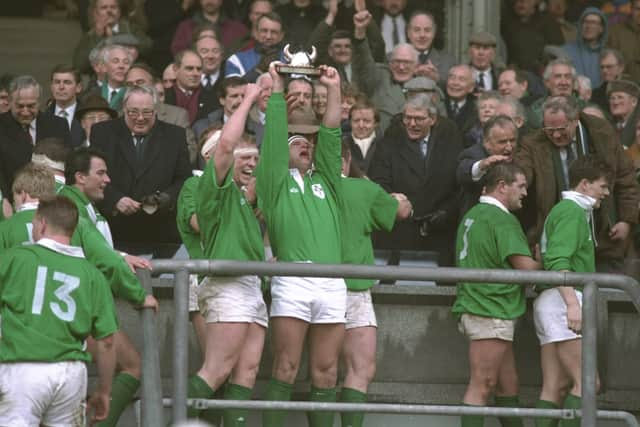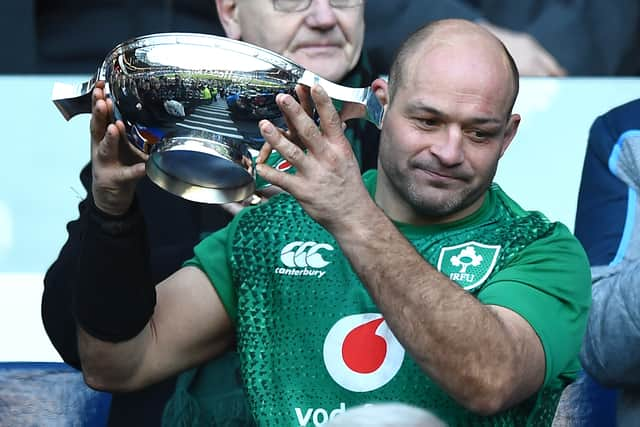How many Six Nations trophies are there? Rugby championship 2022 titles - from Grand Slam to Doddie Weir Cup
and live on Freeview channel 276
Every year in the Six Nations Championship sees England, France, Ireland, Italy, Scotland and Wales compete to lift the biggest prize in Northern Hemisphere rugby.
However, there’s more than just the overall title to compete for with a host of different trophies being contested every single year - some that are over a century old!
Advertisement
Hide AdAdvertisement
Hide AdIn total there are nine trophies that are contested annually and here is everything you need to know about each:
The Six Nations Championship


The Six Nations Championship trophy is the main piece of silverware that all six teams are aiming to lift when the Championship begins each year.
The original Championship Trophy was first presented in 1993 to France, the winners of that year’s Five Nations Championship (as the competition was know before Italy joined in 2000).
In 2015 the trophy was replaced with the current model to better represent all six teams taking part.
The Grand Slam


Advertisement
Hide AdAdvertisement
Hide AdThe Grand Slam is the pinnacle of success in the Six Nations Championship and can also be won by any of the six teams taking part.
Only by beating every other team in the championship in the same year and finishing with a perfect five out of five victories does a team win the Grand Slam.
In many years there is no Grand Slam winner and, although there is no physical trophy to accompany the achievement, it is a prestigious title that turns a side from mere trophy winners into legends of the competition.
The Triple Crown


The Triple Crown is, in many ways, the original trophy of the multi team tournament which first started as the Home Nations Championship in 1883.
Advertisement
Hide AdAdvertisement
Hide AdIt is contested by England, Ireland, Scotland and Wales and is won when one of those nations beats the other three in the same championship.
The current trophy has been awarded since 2006.
The Calcutta Cup


The Calcutta Cup is the very original trophy of the Six Nations that dates all the way back to 1879 and is contested every year between England and Scotland.
Each year the winning captain lifts a replica of the original trophy which is kept on public display in the Museum of Rugby in Twickenham due to its fragile state.
The trophy is of Indian craftsmanship and was created when the Calcutta Club disbanded and had their remaining funds, which were in the form of 270 Rupees, melted down and made into a cup which they presented to the Rugby Football Union (RFU) in 1870 under the provision that it should be competed for annually.
The Millennium Trophy


Advertisement
Hide AdAdvertisement
Hide AdThe Millennium Trophy is contested between Ireland and England, it was introduced in 1988.
Shaped like a viking helmet, it was brought about to mark Dublin's millennial celebrations.
England have won the trophy 20 times while current holders Ireland have won it 14 times.
The Centenary Quaich


The Centenary Quaich was first introduced in 1989 and is contested between Ireland and Scotland.
Advertisement
Hide AdAdvertisement
Hide AdIreland have won the trophy 18 times and are the current holders while Scotland have won it 14 times.
A quaich is a traditional shallow two-handled drinking cup or bowl in Gaelic cultures.
The Giuseppe Garibaldi Trophy


The Giuseppe Garibaldi Trophy is the only prize other than the Six Nations and Grand Slam that Italy compete for as they contest it with France annually.
It was first introduced in 2007 on the 200th anniversary of the birth of the man it is named after, a leader in the unification of Italy and volunteer in the French Republican Army.
Advertisement
Hide AdAdvertisement
Hide AdThe trophy was designed by former French international and professional sculptor Jean-Pierre Rives.
The Auld Alliance Trophy


The Auld Alliance Trophy is one of the two newest in the competition and was introduced in 2018 to be contested between Scotland and France.
It has significant meaning behind it, first being played for to mark the centenary of the end of World War I and to commemorate the French and Scottish rugby players who were killed during the conflict.
The captains of the two national sides in the last match played before the war, Scotland’s Eric Milroy and Marcel Burgun of France, both lost their lives in the conflict.
Advertisement
Hide AdAdvertisement
Hide AdThe name refers to the alliance made in 1295 between the kingdoms of Scotland and France against England.
The Doddie Weir Cup


The Doddie Weir Cup is the second of the new trophies and is contested between Wales and Scotland, it is named after former Scotland international Doddie Weir.
Weir, a beloved figure in world rugby, was diagnosed with Motor Neuron Disease (MND) in 2017 and has since raised millions for MND research through his My Name’5 Doddie Foundation.
The Melrose born lock won 61 caps for Scotland between 1990 and 2000 and celebrated his 51st birthday in July last year.
A message from the editor:
Advertisement
Hide AdAdvertisement
Hide AdThank you for reading. NationalWorld is a new national news brand, produced by a team of journalists, editors, video producers and designers who live and work across the UK. Find out more about who’s who in the team, and our editorial values. We want to start a community among our readers, so please follow us on Facebook, Twitter and Instagram, and keep the conversation going. You can also sign up to our email newsletters and get a curated selection of our best reads to your inbox every day.
Comment Guidelines
National World encourages reader discussion on our stories. User feedback, insights and back-and-forth exchanges add a rich layer of context to reporting. Please review our Community Guidelines before commenting.
